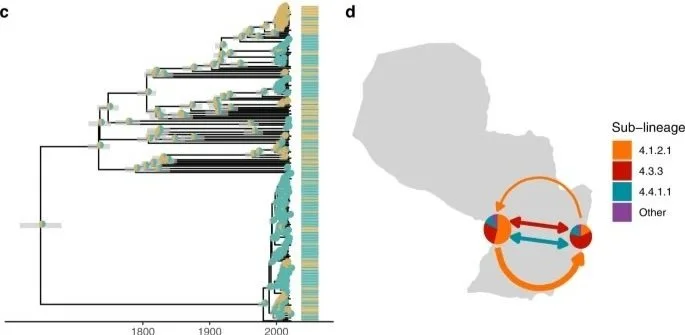
Research
Applied Modeling for Public Health Decision Making
Applied modeling for public health decision-making is a core theme of our research in which we develop and apply mathematical and statistical models to guide effective public health strategies. This work is built on a foundation of over 25 years of collaboration with public health decision makers including, healthcare organizations such as hospitals or long-term care facilities, local and state health departments, federal decision makers including the CDC, and international ministries of health, NGOs, and organizations like the WHO. This theme of our research is driven by close collaborations and aims to use models to provide a specific and timely evidence base for decision support. By translating complex epidemiological data into actionable recommendations, our applied modeling efforts play a crucial role in improving public health outcomes and enhancing preparedness for future health challenges.
Simulation Modeling
Simulation modeling is a key focus of our research, where we create detailed, data-driven simulations to explore the dynamics of infectious disease transmission and the effectiveness of various intervention strategies. Our models aim to assess how infections spread and how different control measures can mitigate these risks. By conducting virtual experiments that would be impractical or impossible in reality, providing valuable insights that help shape public health policies or healthcare delivery and optimizing infection prevention efforts with respect to health outcomes and cost. This approach allows us to anticipate potential outcomes and design more effective strategies to optimize population health.
Emerging and re-emerging infectious diseases
Emerging infectious diseases represent a critical area of our research, where we focus on understanding and responding to emerging and re-emerging pathogens that pose significant threats to public health globally. Our research centers on understanding the factors that drive emergence and spread as well as strategies to control outbreaks. By advancing our understanding of emerging infectious diseases, we aim to enhance global preparedness and inform public health responses to prevent and mitigate future epidemics.
Advancing Epidemiological Theory
Another theme of our research group is advancing epidemiological theory of infectious disease dynamics. We focus on refining theoretical frameworks that underpin key public health concepts, such as the basic reproduction number (R0), transmission heterogeneity, and the implications of intervention strategies. We aim to contribute to inform effective public health policies and interventions, ensuring that our theoretical advancements have practical applications in managing infectious diseases.
Advancing Statistical Methods
Our research is focused on advancing statistical methods to improve the analysis and interpretation of complex epidemiological data. We develop and refine models to estimate key parameters related to disease transmission, particularly in scenarios where data is incomplete or processes are partially observed. By addressing challenges such as missing data and model assumptions, our work enhances the accuracy of transmission estimates, ultimately leading to more reliable and actionable insights for public health interventions.
Evolutionary Epidemiology
Our research explores the evolutionary dynamics of pathogens and their impact on disease transmission and public health. We investigate how genetic variation within and between pathogen populations influences the spread of infectious diseases, focusing on the evolutionary pressures that shape pathogen diversity. By integrating genomic information with epidemiological data, we track pathogen movement across various settings, deepening our understanding of how pathogens evolve and spread. This work not only enhances our comprehension of pathogen evolution but also informs strategies for controlling and preventing infections, ultimately improving public health outcomes.
Determining Infection Pathways in Congregate Settings
Our research focuses on understanding how infections spread within congregate settings such as healthcare facilities, prisons, and other high-density environments. By identifying transmission pathways and evaluating the effectiveness of various interventions, we aim to develop strategies that can effectively control and prevent outbreaks in these vulnerable settings. This work is crucial for improving public health outcomes, particularly in environments where the risk of transmission is elevated.
Microbial Ecology
An emerging theme of in our research group is microbial ecology, where we explore the interactions between microorganisms and their environments. We are investigating how microbial communities evolve, adapt, and interact within various ecosystems, including both the built environment (healthcare settings) and natural environments. By understanding the ecological and evolutionary processes that drive microbial behavior, we aim to uncover the factors that influence pathogen emergence, persistence, and transmission. This growing area of our research provides essential insights into the ecological foundations of infectious diseases, helping to inform more effective strategies for their prevention and control.







